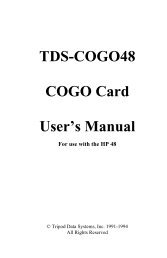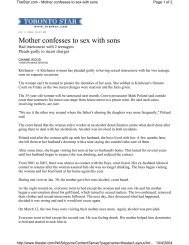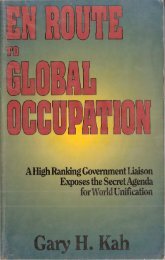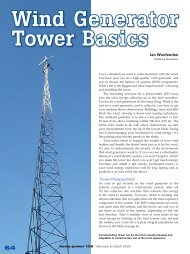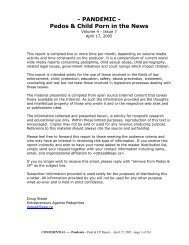G. Edward Griffin - The Fearful Master - PDF Archive
G. Edward Griffin - The Fearful Master - PDF Archive
G. Edward Griffin - The Fearful Master - PDF Archive
You also want an ePaper? Increase the reach of your titles
YUMPU automatically turns print PDFs into web optimized ePapers that Google loves.
against Communist infiltration in UN groups was a factor threatening to destroy<br />
UNESCO." 10 [Italics added.]<br />
<strong>The</strong> following item appeared in newspapers on September 25, 1954. <strong>The</strong> article is<br />
speaking about the Institute of Pacific Relations, which, as previously mentioned, has<br />
been officially described as Soviet dominated. <strong>The</strong> news dispatch said: "Two problems<br />
confront the organization. One is that the work it set out to do is now being duplicated by<br />
wealthier and better equipped world organizations such as the United Nations<br />
Educational, Scientific and Cultural Organization (UNESCO)." 11<br />
In its own literature and periodicals, UNESCO makes its position clear. <strong>The</strong> Communist<br />
Guardian of Melbourne, England, in its May 28, 1959, issue, recommended the UNESCO<br />
Courier to its readers as "a monthly magazine deserving of wide distribution." 12 <strong>The</strong><br />
Courier is so blatant in its Communist propaganda that even the most unobserving reader<br />
can scarcely miss it.<br />
As we have pointed out several times, not all of the people who are advancing the cause<br />
of the United Nations and its specialized agencies are doing so with malice aforethought.<br />
As a matter of fact there are relatively few who are. It has always been the pattern of<br />
successful Communist operation to have unsuspecting idealists do most of the work while<br />
the Communists stay in the background pulling the strings and issuing the directives.<br />
Consequently, many good people are victimized into lending their time, their reputations<br />
and their money. Unfortunately once a person has done this he gradually acquires a<br />
vested interest in his own error and even though he finds more and more aspects of the<br />
United Nations which run counter to his sensibilities, he tends to brush them aside rather<br />
than swallow his pride and admit that he made an original mistake in judgment. Most<br />
humans are like that, but occasionally there is an exception.<br />
Mr. John M. Larson, as an active, respected and well-known citizen in his community, had<br />
been invited by the State Department to become a member of the United States National<br />
Commission for UNESCO. Like most Americans, he considered this to be an honor and<br />
felt that it was his duty to accept, which be did. He soon discovered, however, that he had<br />
been invited solely for the prestige that his name would add to the commission. He was<br />
expected to be satisfied with the role of a yes-man for all the decisions of the full-time staff<br />
and senior members of the commission. He expressed a desire to participate in UNESCO<br />
planning sessions as he was theoretically allowed to do¾ volunteering to travel at his own<br />
expense. But he was not advised of the meetings. He tried to make his voice felt through<br />
correspondence and personal visits with the commission secretariat. He was ignored as<br />
were his recommendations. Finally he resigned in protest. Here is what Mr. Larson<br />
revealed:<br />
With respect to UNESCO's literature, it has very little substance, and<br />
what little it does have, appears overtly or covertly to be slanted away<br />
from the spiritual and political beliefs and traditions of the United States<br />
of America toward the sterile conceptions of a nebulous one-world<br />
government or federation which is to be built upon atheistic foundations.<br />
. . . I found grave errors of omission and distortions of perspective with<br />
respect to historical trends and events and to the growth and<br />
development of certain ideas. For these reasons, it is important to<br />
analyze what UNESCO does not present and proclaim as well as what it<br />
does present and proclaim, in order to gain an understanding of what its<br />
aims are. . . . Peoples today are interested in achieving some sort of


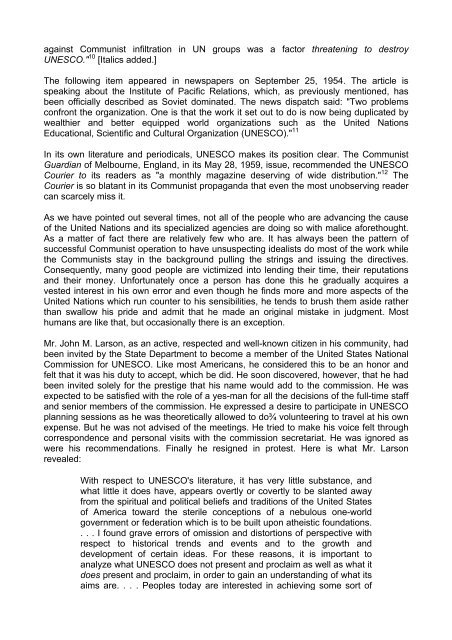
![Robert T McQuaid [rtmq@stn.net] Sent: Friday, October 29, 2004 12 ...](https://img.yumpu.com/51070071/1/190x245/robert-t-mcquaid-rtmqstnnet-sent-friday-october-29-2004-12-.jpg?quality=85)

